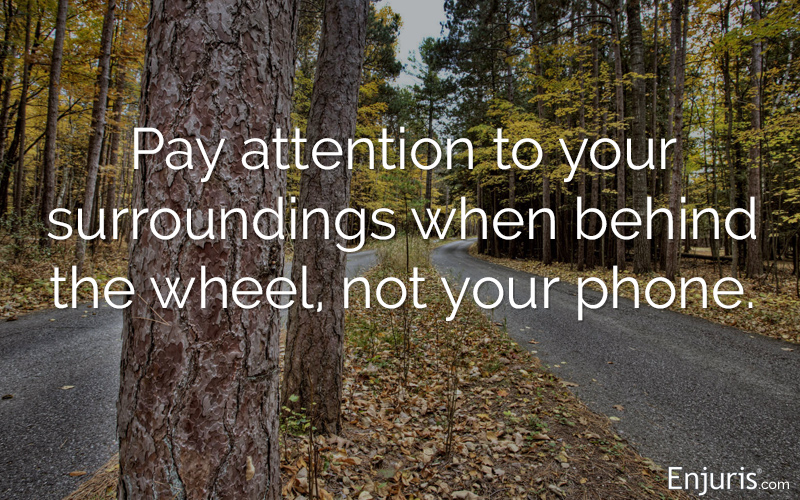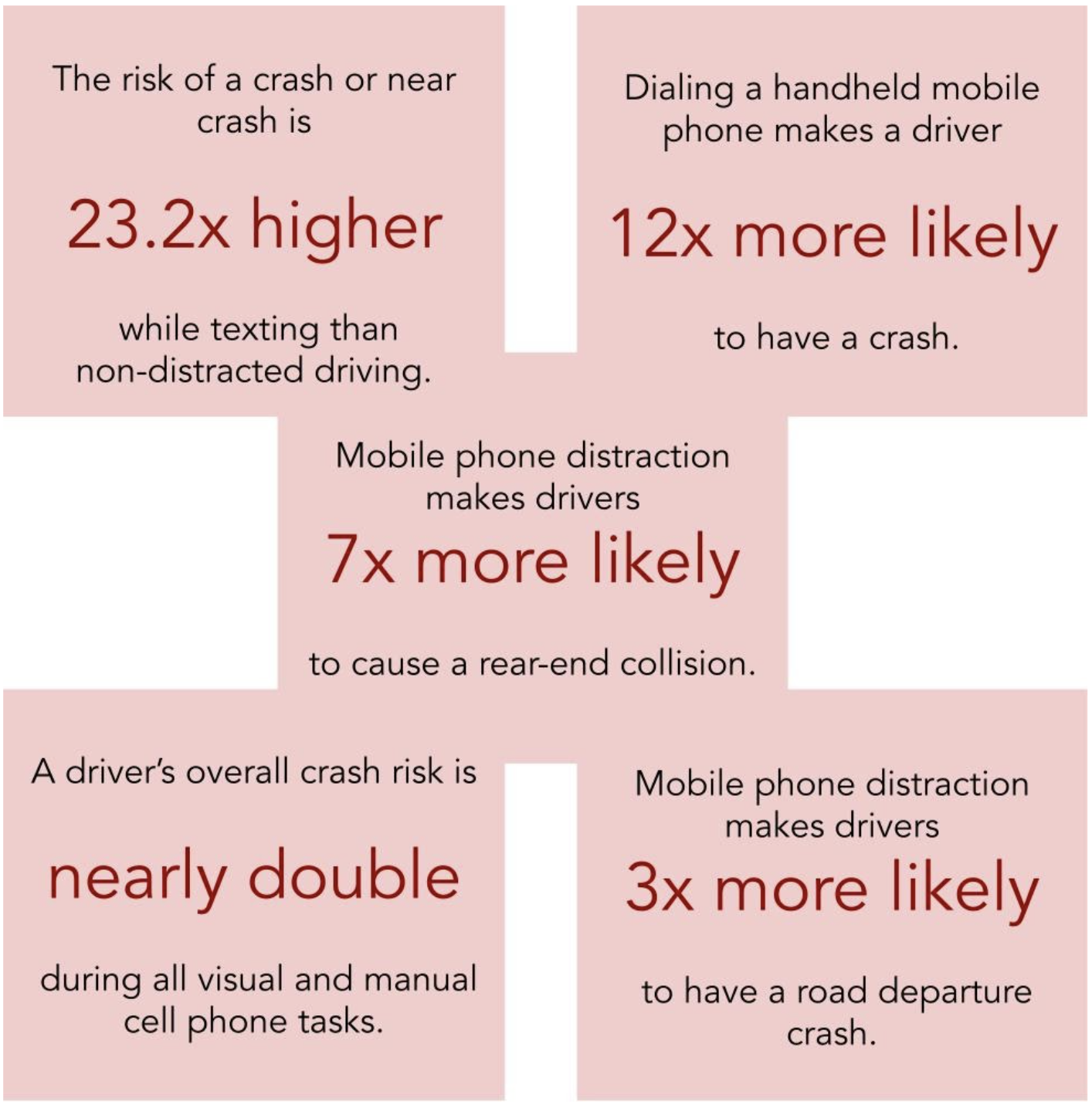
Cell phones aren’t the only distraction you face behind the wheel.
Texting while driving has been prohibited by law in Michigan since 2010. If you’re caught texting and driving, you can be fined $100 for a first offense and $200 for subsequent offenses.
But texting isn’t the only way you can be distracted while driving.
What is distracted driving?
There are 3 types of distractions:
Manual: Any activity that requires you to take your hands off the steering wheel.
Cognitive: Any activity that takes your mind off the task of driving.
Even the most careful driver occasionally does something that’s considered a distraction — and more important than it the fact that it’s against the law is the reality that distracted driving is dangerous.
What activities cause distraction while driving?
- Using a mobile phone or electronic device in any way (not just for texting or talking)
- Eating or drinking
- Passengers (making noise or behaving in a distracting way)
- Hair brushing, applying makeup, shaving, or other personal grooming
- Reading or viewing paper maps
- Using a GPS or other navigation system
- Using other dashboard controls (adjusting heat or cooling, or other functions)
- Adjusting the radio or CD player
- Loud music
- Outside distractions (something happening outside your vehicle)
Certainly, this is not a complete list of distractions you could experience, but they’re the most common.
The science behind texting and driving
The National Highway Traffic Safety Administration (NHTSA) reported that 3,166 people were killed by distracted drivers in 2017, the most recent year for which data is available.
- Nine percent of all traffic-related fatalities in 2017 were caused by distracted drivers.
- The 15- to 19-year-old age group has the highest proportion of distracted drivers in fatal crashes
- There were 599 pedestrians and bicyclists (i.e. non-occupants of cars) killed in distracted driving crashes in 2017.
Source: NHTSA Traffic Safety Facts

Michigan laws for using mobile phones while driving
Although texting while driving is illegal in Michigan, there currently is no law against using a mobile phone to talk for most drivers. Teens, however, are not permitted to use a mobile phone for any purpose while driving under Kelsey’s Law.
Kelsey and Stacey were on the phone with each other at the time of the accident. Stacey died in a separate car accident in April 2019.
Kelsey’s Law
Kelsey Raffaele’s mom, Bonnie, was a strong advocate for what became known as Kelsey’s Law, which makes it illegal for teen drivers to use a cell phone while behind the wheel, but allows a phone connected to Bluetooth or otherwise integrated into the vehicle.
Specifically, Michigan state law says that teen drivers with a Level 1 or Level 2 driver license are prohibited from:
- Initiating a call
- Answering a call
- Listening to or talking on a mobile phone
The only exceptions are:
- Reporting a traffic accident, medical emergency, or serious road hazard
- Calling for help if you believe your personal safety is in danger
- Reporting a crime or preventing a crime against yourself or someone else
It’s true that drivers under 20 years old have the highest rates of distraction-related fatalities, but distracted driving isn’t just a teenage problem. For one thing, it affects everyone — not just the driver, but any person who shares the road as a driver, pedestrian, or bicyclist.
In a survey by the Centers for Disease Control and Prevention (CDC), 42% of high school students reported sending texts or emails while driving within the month prior to the survey.
The students who reported frequent texting while driving were also less likely to wear a seatbelt, more likely to ride with a driver who had been drinking, and more likely to drink and drive.
However, two-thirds of adults have admitted to reading texts at a red light and more than a quarter of drivers have sent texts while driving. But texting and driving is just as dangerous as driving drunk.
Texting and driving is a primary offense in Michigan
A primary offense means that you can be pulled over and charged with texting and driving as the only reason you’re being stopped. In some states, it’s a secondary offense. In that situation, you’d only be charged with texting and driving if you were pulled over for some other reason (for instance, speeding, failing to stop at a signal, etc.).
Penalties for a Michigan texting and driving accident
If a driver is texting while driving and causes an accident, there are different criminal penalties than an accident where there’s no texting involved.
| Injuries caused by a driver while texting | Penalty |
|---|---|
| Death of another person | Can be found guilty of a misdemeanor and sentenced to jail for 1 year and pay a fine of $2,000. |
| Serious injury to another person | Can be found guilty of a misdemeanor and sentenced to jail for up to 93 days and pay a fine of $500. |
| Causes any collision with a person, vehicle, or another object | 4 points on their driver’s license |
Liability in a Michigan texting and driving accident
Criminal penalties for texting and driving can affect the driver involved in a crash. But a criminal sentence for a guilty driver doesn’t financially help the person who was injured.
Michigan is a no-fault insurance state, which means an insurance company covers its own policyholder for their injuries, regardless of who is at fault.
However, in a texting and driving accident, you can sue the texting driver for your injuries or for the wrongful death of a family member. This can include damages for pain and suffering and other expenses.
Michigan modified comparative fault rule
Michigan follows a modified comparative fault system, or “51% Rule.”
When an accident happens that involves more than 1 driver, the insurance companies will determine who’s at fault. In many situations, while 1 driver might have caused the accident, there are ways that the other driver might have avoided it and therefore they may be held partially responsible.
If you were injured in a car accident and can prove that the other driver was distracted, it would likely increase their percentage of liability.
Often, texting is the easiest type of distraction to prove because a lawyer can subpoena cell phone records that show exactly what time calls were made, texts were sent, and other functions used, which means they have a better picture of what the driver was doing at the time of the crash. Other types of distractions like eating, passenger behavior, or other activities would be more difficult to prove absent witness testimony.
What if the driver is texting as part of their job?
If a person is texting or reading texts related to their job, and if the employer knows or should know that the person is driving while texting, both the driver and the employer could be sued for negligence.
Employers should make it clear to employees that texting and driving is not acceptable and not permitted.
10 safe driving tips to avoid distracted driving
We’ve talked a lot about how you can be affected by someone else’s distracted driving, but there are also things you can do to make sure that you are not distracted behind the wheel. Here are some actionable tips to avoid causing a distracted driving accident:
- Never hold your phone in your hand. If you need to use it for GPS, mount it to the dashboard so you can see the map without taking your eyes off the road. Turn off other notifications so that you’re not seeing other banners or pop-up notifications on the map while driving.
- Silence your phone before getting in the car.
- It’s not just about texting — don’t use any apps or social media while driving. If you need to send a text or look at something, pull over where it’s safe to do so. If you can’t resist looking at your phone when it buzzes, keep it somewhere you can’t get to it like in the back seat or trunk — that way you’re not tempted to sneak a peek. Some phones now have a Do Not Disturb While Driving function. If yours has this capability, consider equipping it.
- Keep your music or other listening material at a low enough volume that you can hear sounds outside the car.
- Don’t text or call someone if you know they’re likely to be driving.
- Don’t eat or drink while driving.
- If you listen to music or podcasts from your phone while driving, queue your selections before you start driving so you don’t have to touch your phone while behind the wheel.
- Don’t allow your passengers to be a distraction. Keep pets in a carrier.
- If you drop something on the floor of the car, either leave it there until you’ve reached your destination or pull over to retrieve it.
- Regardless of what’s happening outside the car, don’t use your phone to take videos while driving. If you feel like recording traffic is useful, purchase a separate dashcam that can record without driver intervention.
As a driver, you have a duty to every other person who shares the road — other drivers, passengers, pedestrians, and bicyclists. That means you have a legal duty to each of those people, as well, which is to avoid behaving in any way that would cause them harm or injury.
Damages for distracted driving crashes
Along those same lines, if you’re the victim of distracted driving, you deserve to receive financial compensation.
The purpose of the personal injury law system is to make an injured person whole. While no court or lawsuit can heal your physical injuries, the legal system is designed to restore you to the financial condition you’d be in if the accident hadn’t happened.
In that effort, you may be able to recover damages for:
- Costs for medical treatment, both current and future
- Lost wages and earning capacity, current and future
- Ongoing therapies and adaptive devices
- Assistance with costs of daily living (housekeeping, home aides, etc. if you’re disabled as a result of the accident)
- Property loss (cost of vehicle repair or replacement)
- Pain and suffering and other emotional distress
- Other expenses related to the accident
Michigan also awards exemplary damages, which are added compensation awarded to the plaintiff if the defendant’s behavior is especially egregious or if they had a chance to avoid harm and didn’t do so.
For these reasons, it’s important to seek the advice of a qualified attorney. Your attorney will minimize your liability for the accident and maximize the amount of damages you can recover.
If you’re searching for an experienced Michigan car accident attorney, we invite you to browse the free Enjuris law firm directory.
Just don’t call them while you’re driving — even the most important phone calls can wait until you’ve arrived at your destination.
See our guide Choosing a personal injury attorney.
